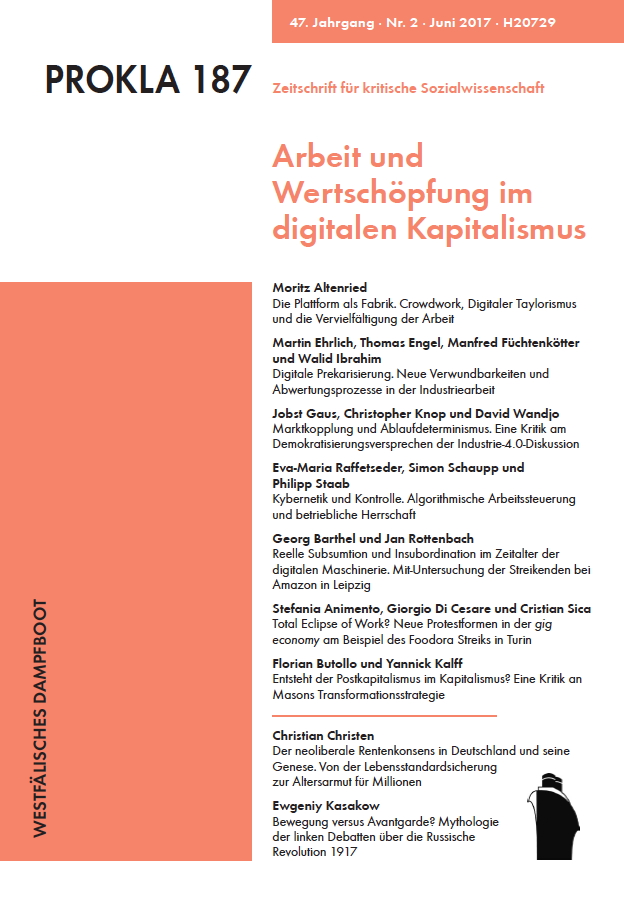Marktkopplung und Ablaufdeterminismus
Eine Kritik am Demokratisierungsversprechen der Industrie-4.0-Diskussion
DOI:
https://doi.org/10.32387/prokla.v47i187.142Schlagworte:
Industrie 4.0, Demokratie, Dezentralisierung, Arbeit, Digitaler KapitalismusAbstract
Through the ongoing debate different positions support the hypothesis that Industry 4.0 evokes decentralization in everyday works. In this article we argue that the technological premises of Industry 4.0 lead to the contrary: centralized planning ensuing from optimized adaptation to the imperatives of the market. We exemplify this pattern, that we named ‘determinated procedure’, through exemplary cases from different industrial branches. Furthermore, we argue that (indeed) existing decentral moments neither amount to structural decentralization nor to humanizing and empowering concessions to employees, but rather primarily serve to their integration into the enterprise and mobilization of their production intelligence.
Downloads
Literaturhinweise
Bitkom (2016): Die Zukunft von ERP im Kontext von Industrie 4.0. Positionspapier. Berlin.
Boes, Andreas/ Bultemeier, Antja/Gül, Katrin/Kämpf/Tobias, Langes, Barbara/Lühr, Thomas/Marrs, Kira/Ziegler, Alexander (2015): Zwischen Empowerment und digitalem Fließband: Das Unternehmen der Zukunft in der digitalen Gesellschaft. In: Boes, Andreas/Sattelberger, Thomas/Welpe, Isabell (Hrsg.): Das Demokratische Unternehmen. Freiburg/Br: 57-73.
Bundesministerium für Bildung und Forschung (BMBF) (2015): Industrie 4.0. Innovationen für die Produktion von Morgen. Bonn.
Bundesministerium für Bildung und Forschung (BMBF) (2013): Zukunftsbild "Industrie 4.0". Bonn.
Bundesministerium für Wirtschaft und Energie (BMWE) (2015): Industrie 4.0 und Digitale Wirtschaft. Impulse für Wachstum, Beschäftigung und Innovation. Berlin.
Butollo, Florian/Ehrlich, Martin/Engel, Thomas (2017): Amazonisierung der Industriearbeit? Industrie 4.0, Intralogistik und die Veränderung der Arbeitsverhältnisse in einem Montageunternehmen der Automobilindustrie. In: Arbeit 26(1): 33-59. https://doi.org/10.1515/arbeit-2017-0003
Democratic Organzation (2017): Über uns - Idee. URL: http://democraticorganization.com/idee/, Zugriff: 25.4.2017.
Dörre, Klaus (2014): Industrie 4.0. Neue Prosperität oder Vertiefung gesellschaftlicher Spaltungen. Sechs Thesen zur Diskussion. Jena. https://doi.org/10.5771/9783845263205-270
- (2015): Das demokratische Unternehmen. Ein zukunftstaugliches Leitbild? In: Boes, Andreas/Sattelberger, Thomas/Welpe, Isabell (Hg.): Das Demokratische Unternehmen. Freiburg/Br: 95-114.
Dorst, Wolfgang (2015): Arbeit in der Industrie 4.0. URL: bpb.de/dialog/netzdebatte/200824/arbeit-in-der-industrie-4-0, Zugriff: 25.4.2017.
Eichhorst, Werner/Kendzia, Michael/Schneider, Hilram/Buhlmann, Florian (2013): Neue Anforderungen durch den Wandel der Arbeitswelt. Kurzexpertise für die Enquete-Kommission "Wachstum, Wohlstand, Lebensqualität" des Deutschen Bundestages. Bonn.
Fraunhofer-Institut für Arbeitswirtschaft und Organisation (Fraunhofer-IAO) (2013): Produktionsarbeit der Zukunft. Industrie 4.0. Stuttgart.
Frey, Carl Benedikt/Osborne, Michael A. (2013): The future of employment. How susceptible are jobs to computerisation? Oxford.
Hirsch-Kreinsen, Hartmut (2014a): Wandel von Produktionsarbeit. Industrie 4.0. In: WSI-Mitteilungen, Nr. 6: 421-429. https://doi.org/10.5771/0342-300X-2014-6-421
- (2014b): Welche Auswirkungen hat "Industrie 4.0" auf die Arbeitswelt? In: WISO Direkt, Nr. 12: 1-4.
Jürgens, Ulrich: Lean Production/Toyotismus. In: Hirsch-Kreinsen Hartmut/Minssen, Heiner (Hg.)(2013): Lexikon der Arbeits- und Industriesoziologie. Berlin: 313-319. https://doi.org/10.5771/9783845273099-313
Kurz, Constanze (2015): Die nächste industrielle Revolution? Ein Gespräch mit Constanze Kurz (IG Metall) über "Industrie4.0". In: Mittelweg 36 12(6): 85-98.
Lazzarato, Maurizio (1996): Immaterial Labour. In: Paolo Virno/Michael Hardt (Hg.): Radical Thought in Italy: A Potential Politics. Minneapolis.
Marcuse, Herbert (1970): Der eindimensionale Mensch. Berlin.
Milgrom, Paul/Roberts, John (1990): The Economics of Modern Manufacturing: Technology, Strategy, and Organization. In: The American Economic Review 80(3): 511-28.
Opaschowski, Horst W. (2004): Deutschland 2020. Wie wir morgen leben - Prognosen der Wissenschaft. Wiesbaden. https://doi.org/10.1007/978-3-322-93451-2
Pfeiffer, Sabine (2015): Warum reden wir eigentlich über Industrie 4.0? Auf dem Weg zum digitalen Despotismus. In: Mittelweg 36 12(6): 14-36.
Schmiede, Rudi (2015): Homo faber digitalis? Zur Dialektik von technischem Fortschritt und Arbeitsorganisation. In: Mittelweg 36 12(6): 37-58.
Rottkay, Klaus von (2015): Arbeiten 4.0: Mehr Eigenverantwortung wagen. In: Boes, Andreas/Sattelberger, Thomas/Welpe, Isabell (Hg.): Das Demokratische Unternehmen. Freiburg/Br: 249-262.
Welpe, Isabell/Tumasjan, Andranik/Theurer, Christian (2015): Der Blick der Managementforschung. In: Boes, Andreas/Sattelberger, Thomas/Welpe, Isabell (Hg.): Das Demokratische Unternehmen. Freiburg/Br: 77-94.






